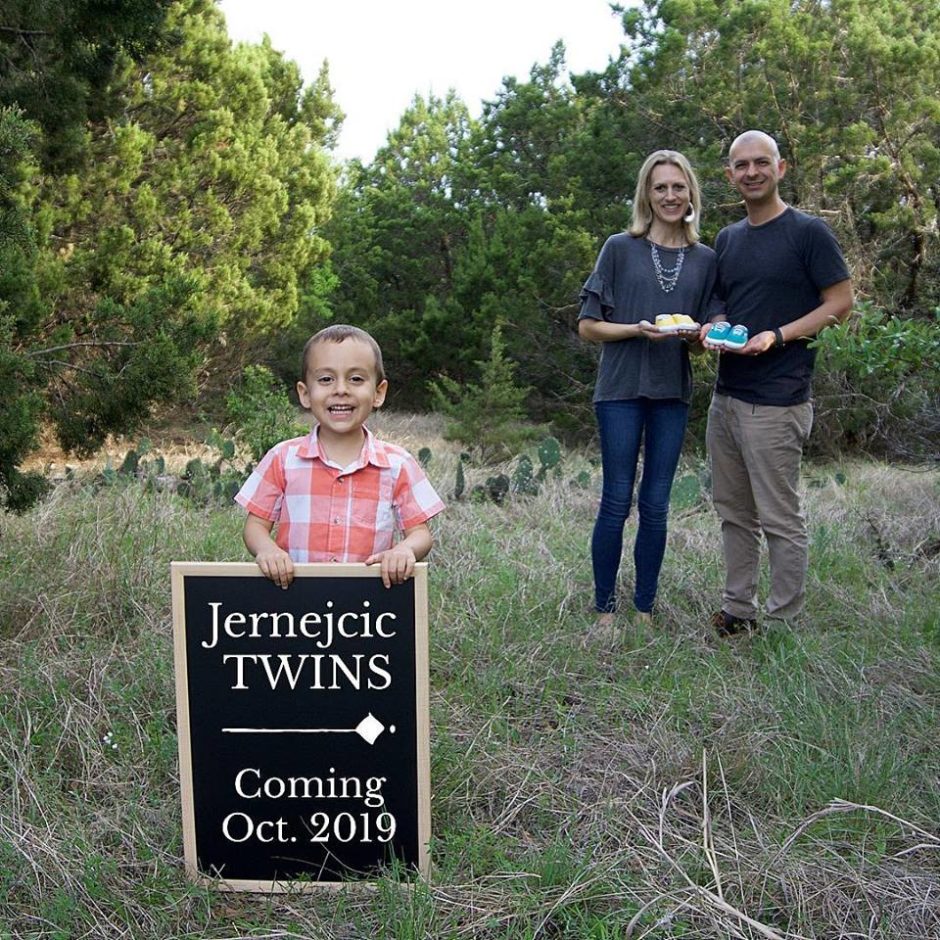
This past week (April 21-29) was National Infertility Awareness Week. Though few of us like to talk about this sensitive and heartbreaking issue, it affects 1 in 8 couples—in other words, I can almost guarantee that you or someone you know has been touched in some way by infertility.
I am one of those women. And in an effort to remove some of the stigma and shame surrounding infertility, in the past year I’ve begun to open up about my own experience with secondary infertility.
For those who might be unfamiliar with the term, secondary infertility is the inability to become pregnant or to carry a baby to term after previously giving birth to a baby. This is our story exactly. When my husband and I first began trying for a family in the fall of 2013, we were pregnant within a month. We lost that first baby to early miscarriage, but conceived again just a few months later. I delivered our healthy baby boy, Charleston, in January of 2015, and we had hoped to add to our family almost immediately after he was born. However, the Lord had different plans for our family.
By God’s grace, our story is proving to have a happy ending: this February I discovered that after years of waiting, I was finally pregnant. A few weeks later we learned that I was carrying twins (originally triplets)! I can’t begin to express how grateful we are for these two precious lives; not every infertility journey ends with such happiness. But in the midst of infertility, I did not know what our outcome would be, and those four years of longing for a second child were lonely, painful, and heartbreaking.
It wasn’t until last year, when we’d exhausted more natural options and had begun seeking medical assistance to conceive another child, that I began to open up about our experience. Looking back, I wish we hadn’t suffered in silence for as long as we did, but even in the past year—when I was fairly candid about all that we were going through—I kept aspects to our journey to myself.
Now, having come out on the other side of that difficult time, I feel compelled to share more of our experience in order to shed light on this issue for those who might not understand it, and to encourage those who may be walking a similar road.
Every path to pregnancy is unique. In some ways, mine was less difficult than others: we already had one healthy child (believe me, I do not take this for granted), and we thankfully did not have to undergo more rigorous fertility measures such as IVF to achieve this twin pregnancy. Still, our road was far from smooth. Below are some of the reflections that I recorded in my journal over the last few years going through secondary infertility.
Secondary infertility is . . .
Standing idly by, feeling helpless and hopeless, as the dream of “two under two” or even “two under three” or “two under four” slowly slips away. Wondering if I should still hold onto the baby gear, or pass it on to somebody else—essentially relinquishing all hope of another child.
The bittersweet emotions wrapped up in each of my son’s milestones as I wonder if this will be my only chance at watching a child grow.
The agony of pregnancy announcements. Staying off of social media so that I don’t have to encounter them virtually, and doing my best to hold back the tears when a friend or family member shares her news in person. Longing to rejoice in the beautiful news that another new life is forming, while internally harboring resentment over the barrenness of my own womb. Then, the subsequent guilt for such selfishness, and embarrassment over my growing awareness that I’m that person everyone is afraid to tell that they’re pregnant.
Shielding well-meaning but insensitive comments and advice from strangers and friends offering trite platitudes and suggestions to “just try this essential oil” or “don’t stress, that makes it harder to conceive” . . . as if I hadn’t already tried that! Attempting to respond politely, while inwardly breaking into even more fractured little pieces.
Unconsciously yet constantly calculating the age difference of my friends’ kids, of children we pass on the street, and even of characters in books. Two years, three years, four or more—what is normal? How big of an age gap is too large to be insurmountable?
Watching more wrinkles sprout up on my own face, and wondering if I have passed the “acceptable” age of bearing more children. Turning thirty-two then thirty-three then thirty-four, and knowing that if I do conceive again, I will likely have the dreaded “advanced maternal age” label plastered on my charts.
Engaging Charleston’s dreams of having brothers and sisters, joining him in his prayers for a baby, while having to remind him that God doesn’t always answer our prayers in the ways that we want. Worrying that his unanswered prayers will lead to a crumbling of his innocent, budding faith.
Clinging to my son, loving him with all I have in me and praying that he will never worry that he wasn’t enough for me. Hoping that he will one day understand that my desire for more children had NOTHING to do with something he was lacking, and EVERYTHING to do with a desire to simply have more of all that is good and sweet and wonderful about him as my child.
Wishing that one child could be enough, feeling selfish and ungrateful and ashamed because I have SO MUCH MORE than many women long for. Coming to terms with my inability to relinquish the desire for more. . . even if it is selfish, and not at all what I deserve.
“The English language lacks the words to mourn an absence. For the loss of a parent, grandparent, spouse, child or friend, we have all manner of words and phrases, some helpful some not. Still we are conditioned to say something, even if it is only ‘I’m sorry for your loss.’ But for an absence, for someone who was never there at all, we are wordless to capture that particular emptiness. For those who deeply want children and are denied them, those missing babies hover like silent ephemeral shadows over their lives. Who can describe the feel of a tiny hand that is never held?” ― Laura Bush, Spoken from the Heart
Secondary Infertility is. . .
The constant awareness of my current cycle day, knowing it better than I know the date on the calendar. The ever-present anxiety that I have forgotten a pill, botched an injection, or missed an important fertility window.
Day after day of ovulation predictor kits, carefully timing my fluid intake and the relieving of my bladder so as to get the most accurate results.
The stress of rearranging schedules, canceling plans, and coordinating child care to fit in a doctor’s visit or baby-making “homework” on the appropriate days.
The humiliation of bringing my son along to OB-GYN appointments, attempting to delicately answer his questions about transvaginal ultrasounds and other procedures I never thought I would have to explain to a three-year-old.
Injecting my stomach, my thigh, my arm . . . and knowing the physical pain could never compare to the aching in my heart.
Weight gain, headaches, fluid retention, painful bloating, nausea, hot flashes, acne, eczema outbreaks, back pain, mood swings, and countless other uncomfortable side effects from so many foreign hormones floating through my body.
Paying the mounting medical bills, each statement coming well after the news that the previous month’s expensive doctor’s visits and prescriptions had all been for naught.
A loss of intimacy with my husband as our marital bed becomes a place for unsuccessful baby-breeding rather than love-making.
The compassion in the pharmacist’s eyes as she presses a prescription into my hands and kindly whispers, “I hope this works for you this time.” And the empathy on her face when she sees me enter the pharmacy the next month, back for another round of pills that will likely prove ineffective once again.
Monitoring every twinge and change in my body during the agonizing Two Week Wait, googling every symptom, letting my hope build up until I’m about to explode, then the devastating crimson flow that brings my hopes crashing to the ground and sends me spiraling back into a monthly depression.
The exhausting violation of my body by medical professionals as I endure pokes, prods, questions, and scans. Wondering what is wrong with me? Why won’t my body simply do what so many other women do every day? Feeling broken, insufficient, and a inadequate as a mother. A failure. Because what kind of mother can’t even succeed at bringing her child into existence?
“It turns out that conceiving and carrying a healthy baby is just exactly like a lot of other parts of life: way more out of our control than we prefer to believe. There’s a mystery we tend not to acknowledge until certainty has been ripped out of our clutching hands. And only when certainty is gone do we allow ourselves to bend and open to that terrifying mystery, dark and incomprehensible.” – Shauna Niequist, Bittersweet
But secondary infertility is also . . .
Learning to wholeheartedly trust in God in a way that I’ve never had to before. Leaning into Him as my soul source of hope and joy and fulfillment, and having faith that His path for me is best, even if it isn’t the path I would have chosen.
Making peace with the fact that we could be “one and done.” Accepting my identity (perhaps temporary, maybe forever) as an “only child mom”—graciously and without resentment.
Learning to sit in the discomfort of acknowledging God’s goodness while still longing for a different outcome.
Opportunities for hard but important conversations with my son about bodies, reproduction, faith, and trusting God.
Coming into my own voice as someone who has known pain and can empathize with the heartbreak I see in others. Opening myself up to be a shoulder to cry on for those whose dreams have also been momentarily shattered.
Softening to the loss and brokenness I see in this world, and becoming ever more aware of our intense need for a Savior.
The overwhelming, incomparable joy of that first positive pregnancy test and the dawning awareness that this has not been my forever story after all, but merely a difficult but necessary diversion on the path to our complete family.

I will never forget the suffering of those years, and in a way I am grateful for the pain because it formed and shaped me in a way that nothing but brokenness could have. And because of our long road to becoming pregnant, I appreciate the miracle of this pregnancy and of these two developing lives SO MUCH MORE than if it had come easily. It is impossible to not recognize God’s sovereignty in the midst of both my trials AND my celebrations.
It would be easy to remain silent in the aftermath of my secondary infertility, setting past trials aside so that I can focus on the future. But I truly believe God never wastes a pain, and that includes my own. He had a reason for having me walk this road, and sharing my story is redemptive for me and hopefully helpful for others.
If you are walking through infertility, secondary infertility, or miscarriage, please know that you are not alone. God sees you, He loves you, and He understands your tears and heartache. I believe that He is our ultimate source of hope, and regardless of outcome, HE is where the joy is! Not only does God see you and hear you, but there are many other women—myself included—who would be happy to encourage and support you in whatever way we can. Please do not suffer silently.
“…hope is never wasted. Even if what I hoped for did not come to fruition as I had imagined, as I had hoped. Hope is placing the beautifully vulnerable parts of ourselves, our raw selves, into His hands. I believe hope moves His heart; but hope also moves our hearts into His hands. Hope builds trust.” ― Natalie Brenner, This Undeserved Life: Uncovering The Gifts of Grief and The Fullness of Life









